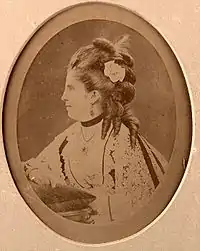Isabella Eugénie Boyer
Isabella Eugénie Boyer (17 Dec 1841 – 12 May 1904) was a French model.

Biography
She was born in Paris to Louis Noël Boyer, an African-born French confectioner, and his English-born wife Pamela Lockwood (aka Pamilla). She married Isaac Merritt Singer, the founder of the Singer Sewing Machine Co., in New York City, in 1863 when Isaac was 52 and Isabella was only 22. Singer had a previous common-law wife, Mary Ann Sponsler, who had Isaac arrested for bigamy.
Isabella and Isaac moved to Oldway Mansion in Paignton, England on the Devon coast because New York society frowned on his many "families." They had six children; Sir Adam Mortimer Singer (1863—1929), Winnaretta Eugénie Singer (1865–1943), Washington Merritt Grant Singer (1866–1934), Paris Eugene Singer (1867–1932), Isabelle-Blanche Singer (1869–1896) and Franklin Merritt Morse Singer (1870–1939).
Isaac Singer is reported to have had a total of 22 children with his many paramours. Singer died in 1875 and left an estate of about $14 million, which at the time was a colossal sum of money. His two wills created family tension and lawsuits. Isabella was declared his legal widow.
On 8 January 1879, Isabella married a Dutch musician, Victor Reubsaet, and settled in Paris. Victor was an internationally successful singer and violinist. He was born in 1843 in Sittard, as Nicolas Reubsaet, a son of a simple shoemaker. Pretending to be of noble descent, he falsely claimed the title Vicomte d’Estenburgh. In 1881, he did obtain the title of Duke of Camposelice from Italian King Umberto I, in appreciation for a generous act of philanthropy in favor of the Italian colonies.[1]
The Duchess of Camposelice was still a striking lady when she met the sculptor Bartholdi. It is rumored she was his model for the Statue of Liberty.
Victor Reubsaet died in September 1887 and Isabella was married, for the third time, in December 1891, to the art collector Paul Sohège.
Isabella Eugenia Boyer died at 62 years of age in 1904 in Paris.
References
- Italy (1883). Gazzetta ufficiale del regno d'Italia, Partie 2 (in Italian). Italy. p. 1475. Retrieved 1 August 2020.